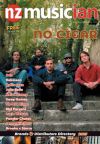The Lawful Truth: Synchronisation Agreements – Part 2
The Lawful Truth: Synchronisation Agreements – Part 2
In the last edition of NZ Musician we began a discussion of the key issues to be aware of in music Synchronisation Agreements, with a particular focus on the use of music in film or TV shows. In this Lawful Truth column well continue that discussion and look further at some of the key issues you should be aware of.
Most film or TV producers will seek to have Synchronisation Agreements include a provision that allows for the use of any song contained in any advertising related to the film or TV programme. Although these clauses are fairly standard you should make sure you have a clear understanding of how they provide for your song to be used. For example, if your song was only used as a very minor incidental piece of music in the film or TV programme and you were paid accordingly, then it is not necessarily fair that your song should be used disproportionally in any advertising campaign.
Another related use of music included in a film or TV show may be as part of related merchandise. For example, in video games, apps, toys or novelty items that reproduce short portions of your song or an adaptation of it. Another example may be where lyrics from your song are reproduced on merchandise clothing. If there is not going to be a separate merchandising agreement which will cover such extra uses then you should make sure these details are at least covered in the Synchronisation Agreement.
Another spin off of the inclusion of your music in a film or television show may be that there is a desire to include the song on an official soundtrack release. If this is the case then you should of course receive further payment for such use, and the detail of this should either be incorporated in the Synchronisation Agreement or once again be the subject of a separate agreement.
When it comes to soundtrack albums there are actually a number of specific issues that need to be dealt with, including the way in which royalties due to you from soundtrack sales are to be calculated. However, just bear in mind that if the recorded version of your song used in the soundtrack is one which is already controlled by a record label, then most of the negotiation in respect of the soundtrack will probably be handled directly between the label and the film/TV producers.
Synchronisation Agreements are also involved in situations where someone wants to use your songs in an advert. In these situations the terms of the agreement are going to vary quite a lot from the type of agreement used for film or TV. For example it should be very clearly specified if this will simply mean them using an existing recording, or if the company making the ad want to re-record the song themselves, which is not uncommon.
In this case you may want to get some indication of the nature of the re-recording before you agree to such use of your music. It may, for example, mean portraying your song in another style (such as taking a rock song and making a reggae or country version of it), and this may not be something youd necessarily be happy with.
Another important consideration whenever someone wants to use your song in advertising is whether they may also want to change any of the words to better represent or highlight the product the advert is selling. The nature of any such proposed word change could once again be a key issue that may in fact dissuade you from having your song licensed for such use.
As a final point on Synchronisation Agreements you should also be aware that although generally speaking your permission will be required before your song is used in a TV programme, there are some exceptions to this. If your songs are administered directly by AMCOS, or by AMCOS via your publisher, then there are certain blanket industry agreements in place that allow companies like TVNZ and TV3 to make use of AMCOS-administered songs in certain ways within programmes produced in-house by those companies.
There is an established royalty system in place that will ensure you are paid for any such use, and there are also important limitations on the use that can be made of your songs in such instances. We will be discussing these blanket licenses more specifically in a future Lawful Truth column.
Uses of songs in this way are of course also subject to the user obtaining any other permission that may be required, such as by having in place an appropriate licence from the licensing body Recorded Music NZ if the recording of the song is one which RMNZ have already been given the broadcast rights to administer.
David McLaughlin is a specialist music lawyer with Auckland law firm McLaughlin Law (www.mclaughlinlaw.co.nz).


